A Report on Psychosocial Aspects of Diabetes: Anna's Case Study
VerifiedAdded on 2023/01/13
|8
|1962
|76
Report
AI Summary
This report examines the psychosocial aspects of diabetes, focusing on the case of Anna, a 17-year-old with type 1 diabetes experiencing hyperglycaemia, depression, and anxiety. The report explores the psychosocial impacts of living with diabetes, including social support, loneliness, and social disruption, and how these factors affect Anna's condition. It analyzes how depression and anxiety hinder self-management of diabetes, emphasizing the impact of stress hormones on blood glucose levels and the potential for obesity. The report then demonstrates how health professionals' understanding of psychosocial factors can improve Anna's condition by screening for mental health issues, promoting healthy communication, providing education on healthy lifestyle choices, and encouraging self-management strategies. The conclusion reinforces the importance of addressing these psychosocial factors for effective diabetes management and overall patient well-being.
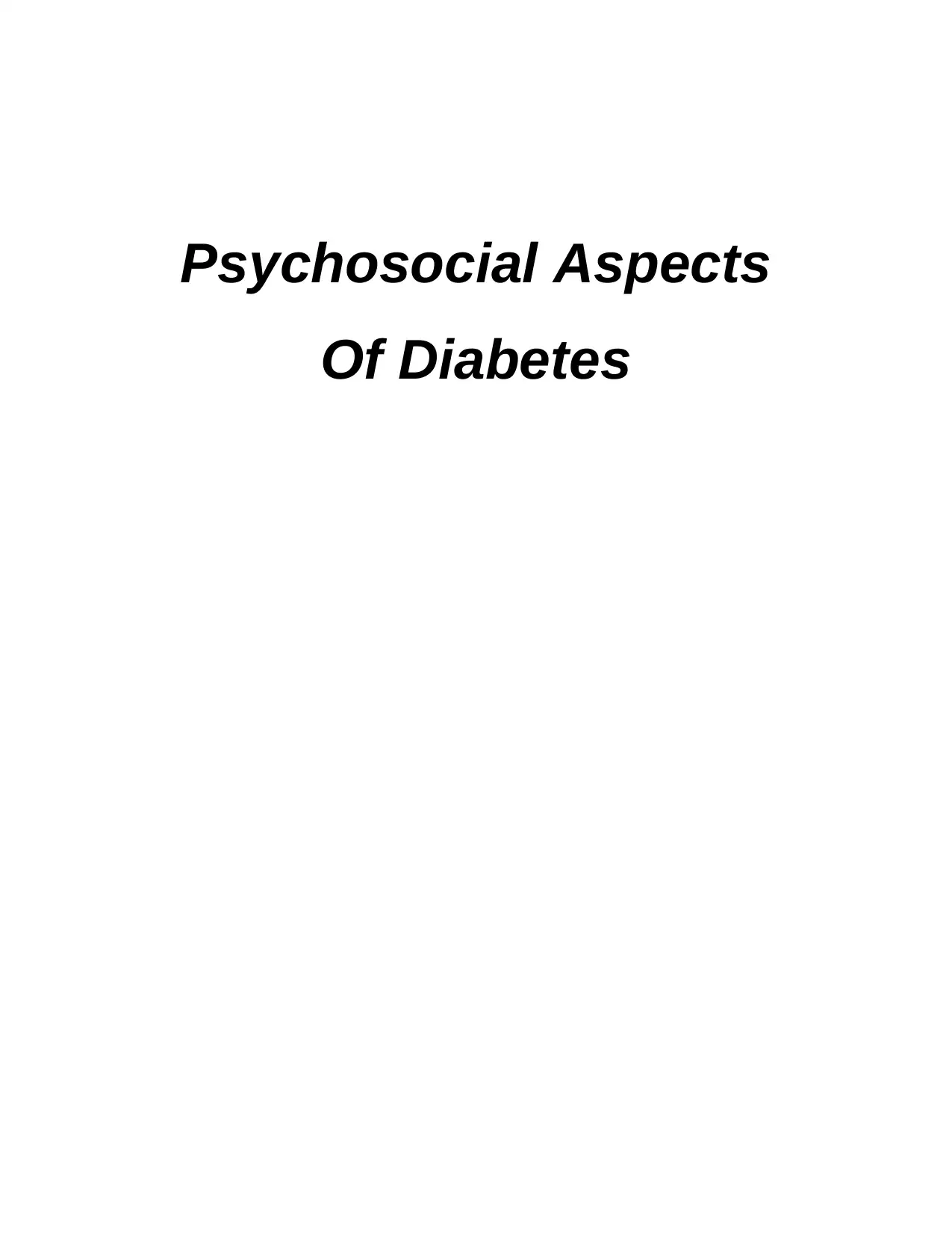
Psychosocial Aspects
Of Diabetes
Of Diabetes
Paraphrase This Document
Need a fresh take? Get an instant paraphrase of this document with our AI Paraphraser
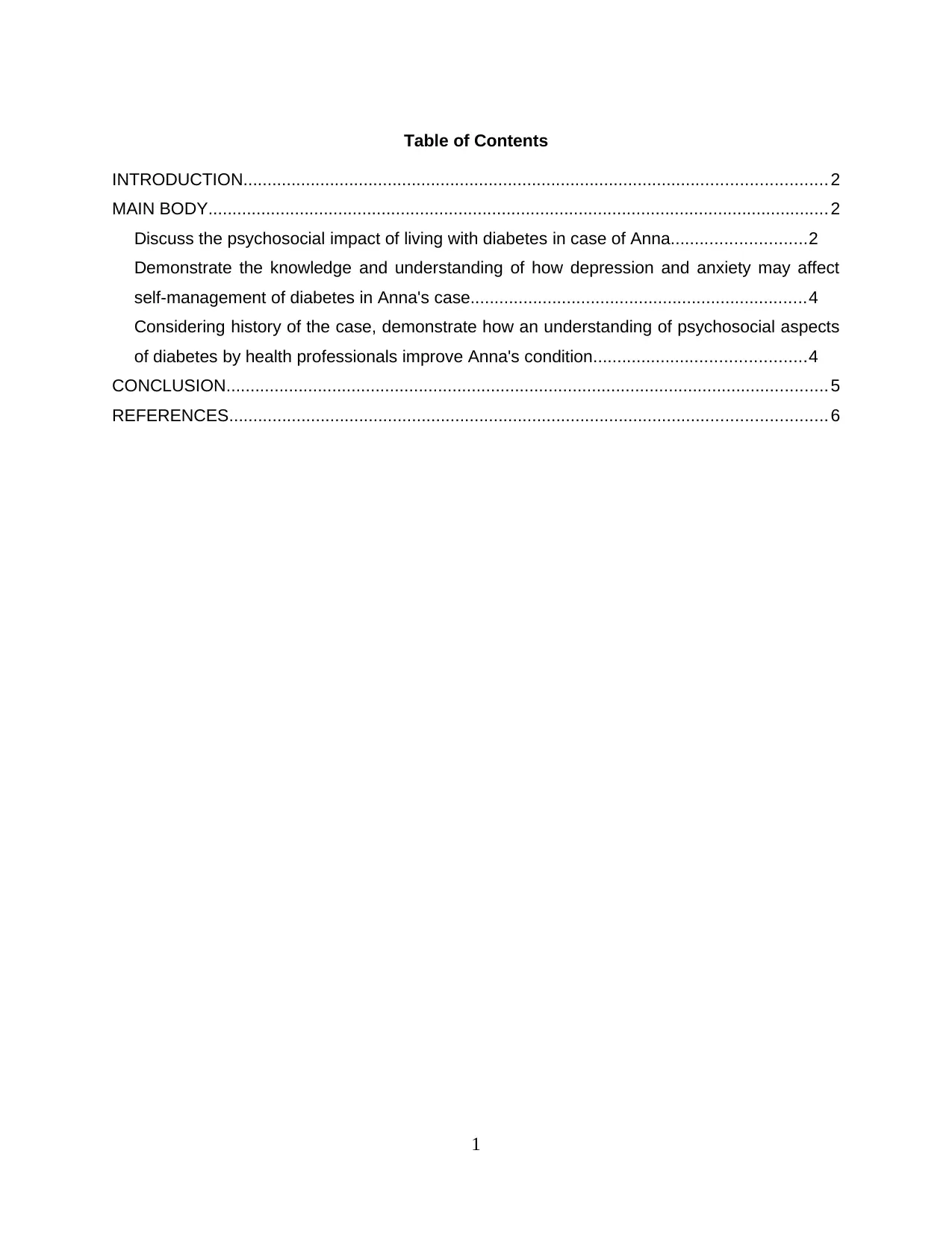
Table of Contents
INTRODUCTION......................................................................................................................... 2
MAIN BODY................................................................................................................................. 2
Discuss the psychosocial impact of living with diabetes in case of Anna............................2
Demonstrate the knowledge and understanding of how depression and anxiety may affect
self-management of diabetes in Anna's case......................................................................4
Considering history of the case, demonstrate how an understanding of psychosocial aspects
of diabetes by health professionals improve Anna's condition............................................4
CONCLUSION............................................................................................................................. 5
REFERENCES............................................................................................................................ 6
1
INTRODUCTION......................................................................................................................... 2
MAIN BODY................................................................................................................................. 2
Discuss the psychosocial impact of living with diabetes in case of Anna............................2
Demonstrate the knowledge and understanding of how depression and anxiety may affect
self-management of diabetes in Anna's case......................................................................4
Considering history of the case, demonstrate how an understanding of psychosocial aspects
of diabetes by health professionals improve Anna's condition............................................4
CONCLUSION............................................................................................................................. 5
REFERENCES............................................................................................................................ 6
1
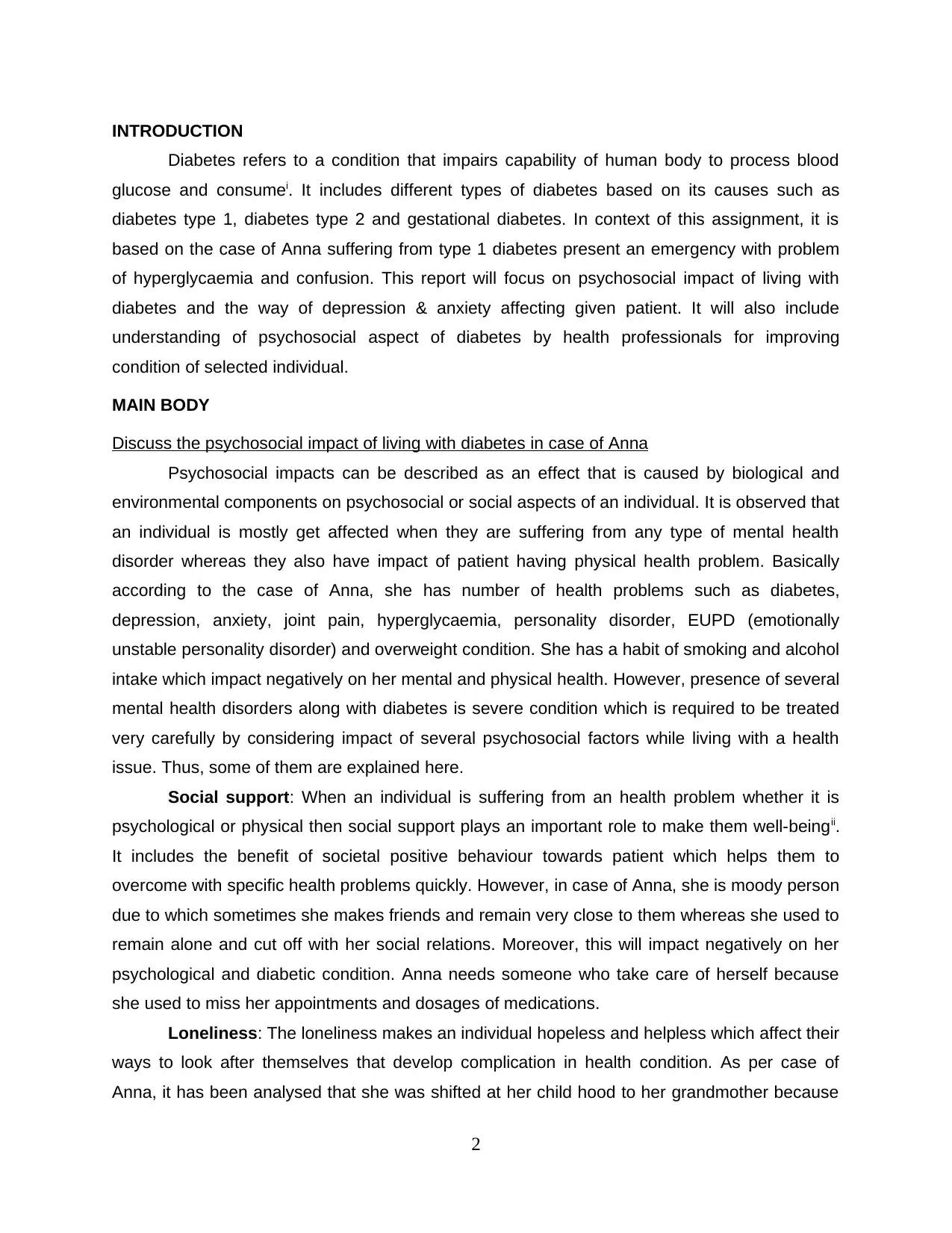
INTRODUCTION
Diabetes refers to a condition that impairs capability of human body to process blood
glucose and consumei. It includes different types of diabetes based on its causes such as
diabetes type 1, diabetes type 2 and gestational diabetes. In context of this assignment, it is
based on the case of Anna suffering from type 1 diabetes present an emergency with problem
of hyperglycaemia and confusion. This report will focus on psychosocial impact of living with
diabetes and the way of depression & anxiety affecting given patient. It will also include
understanding of psychosocial aspect of diabetes by health professionals for improving
condition of selected individual.
MAIN BODY
Discuss the psychosocial impact of living with diabetes in case of Anna
Psychosocial impacts can be described as an effect that is caused by biological and
environmental components on psychosocial or social aspects of an individual. It is observed that
an individual is mostly get affected when they are suffering from any type of mental health
disorder whereas they also have impact of patient having physical health problem. Basically
according to the case of Anna, she has number of health problems such as diabetes,
depression, anxiety, joint pain, hyperglycaemia, personality disorder, EUPD (emotionally
unstable personality disorder) and overweight condition. She has a habit of smoking and alcohol
intake which impact negatively on her mental and physical health. However, presence of several
mental health disorders along with diabetes is severe condition which is required to be treated
very carefully by considering impact of several psychosocial factors while living with a health
issue. Thus, some of them are explained here.
Social support: When an individual is suffering from an health problem whether it is
psychological or physical then social support plays an important role to make them well-beingii.
It includes the benefit of societal positive behaviour towards patient which helps them to
overcome with specific health problems quickly. However, in case of Anna, she is moody person
due to which sometimes she makes friends and remain very close to them whereas she used to
remain alone and cut off with her social relations. Moreover, this will impact negatively on her
psychological and diabetic condition. Anna needs someone who take care of herself because
she used to miss her appointments and dosages of medications.
Loneliness: The loneliness makes an individual hopeless and helpless which affect their
ways to look after themselves that develop complication in health condition. As per case of
Anna, it has been analysed that she was shifted at her child hood to her grandmother because
2
Diabetes refers to a condition that impairs capability of human body to process blood
glucose and consumei. It includes different types of diabetes based on its causes such as
diabetes type 1, diabetes type 2 and gestational diabetes. In context of this assignment, it is
based on the case of Anna suffering from type 1 diabetes present an emergency with problem
of hyperglycaemia and confusion. This report will focus on psychosocial impact of living with
diabetes and the way of depression & anxiety affecting given patient. It will also include
understanding of psychosocial aspect of diabetes by health professionals for improving
condition of selected individual.
MAIN BODY
Discuss the psychosocial impact of living with diabetes in case of Anna
Psychosocial impacts can be described as an effect that is caused by biological and
environmental components on psychosocial or social aspects of an individual. It is observed that
an individual is mostly get affected when they are suffering from any type of mental health
disorder whereas they also have impact of patient having physical health problem. Basically
according to the case of Anna, she has number of health problems such as diabetes,
depression, anxiety, joint pain, hyperglycaemia, personality disorder, EUPD (emotionally
unstable personality disorder) and overweight condition. She has a habit of smoking and alcohol
intake which impact negatively on her mental and physical health. However, presence of several
mental health disorders along with diabetes is severe condition which is required to be treated
very carefully by considering impact of several psychosocial factors while living with a health
issue. Thus, some of them are explained here.
Social support: When an individual is suffering from an health problem whether it is
psychological or physical then social support plays an important role to make them well-beingii.
It includes the benefit of societal positive behaviour towards patient which helps them to
overcome with specific health problems quickly. However, in case of Anna, she is moody person
due to which sometimes she makes friends and remain very close to them whereas she used to
remain alone and cut off with her social relations. Moreover, this will impact negatively on her
psychological and diabetic condition. Anna needs someone who take care of herself because
she used to miss her appointments and dosages of medications.
Loneliness: The loneliness makes an individual hopeless and helpless which affect their
ways to look after themselves that develop complication in health condition. As per case of
Anna, it has been analysed that she was shifted at her child hood to her grandmother because
2
⊘ This is a preview!⊘
Do you want full access?
Subscribe today to unlock all pages.

Trusted by 1+ million students worldwide
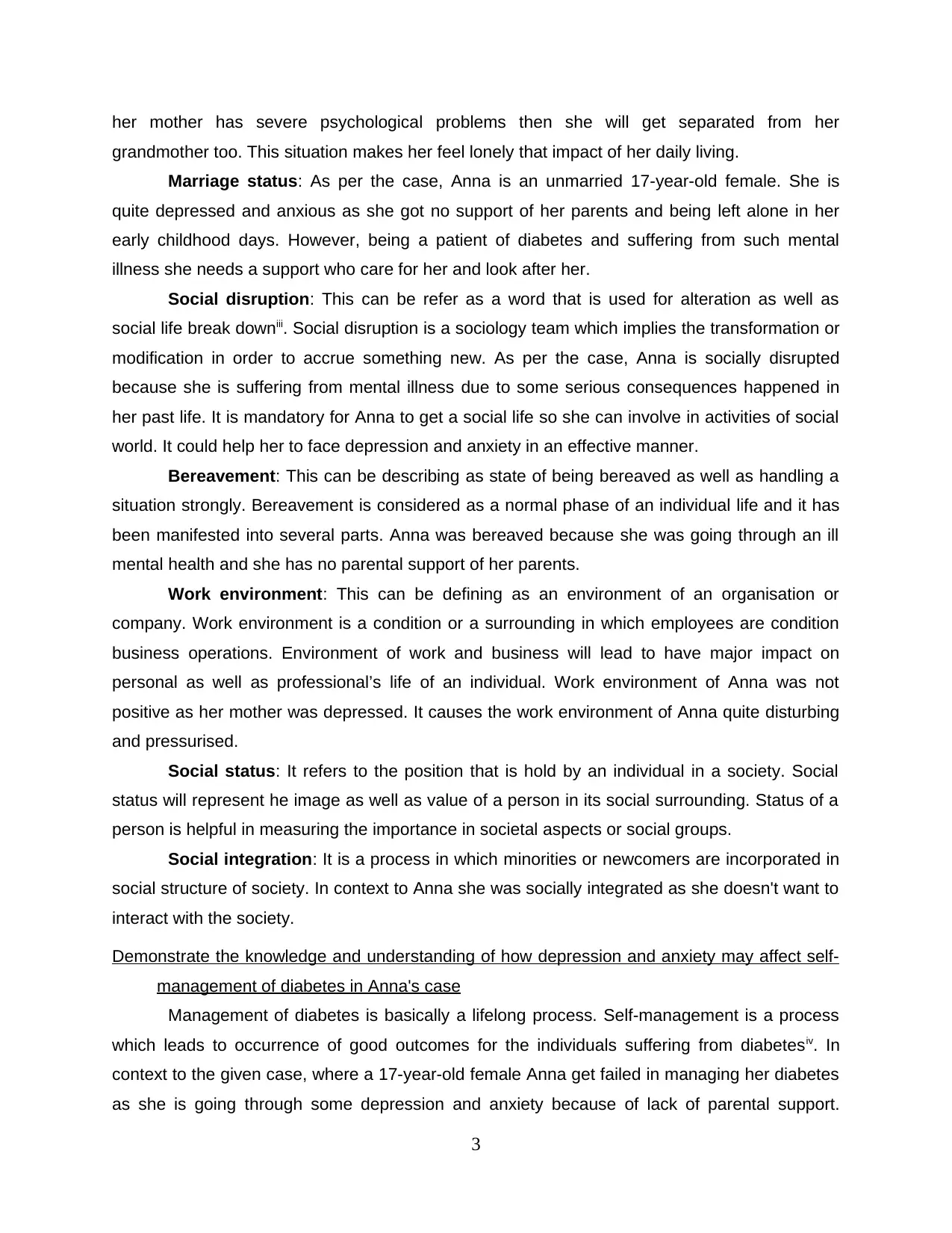
her mother has severe psychological problems then she will get separated from her
grandmother too. This situation makes her feel lonely that impact of her daily living.
Marriage status: As per the case, Anna is an unmarried 17-year-old female. She is
quite depressed and anxious as she got no support of her parents and being left alone in her
early childhood days. However, being a patient of diabetes and suffering from such mental
illness she needs a support who care for her and look after her.
Social disruption: This can be refer as a word that is used for alteration as well as
social life break downiii. Social disruption is a sociology team which implies the transformation or
modification in order to accrue something new. As per the case, Anna is socially disrupted
because she is suffering from mental illness due to some serious consequences happened in
her past life. It is mandatory for Anna to get a social life so she can involve in activities of social
world. It could help her to face depression and anxiety in an effective manner.
Bereavement: This can be describing as state of being bereaved as well as handling a
situation strongly. Bereavement is considered as a normal phase of an individual life and it has
been manifested into several parts. Anna was bereaved because she was going through an ill
mental health and she has no parental support of her parents.
Work environment: This can be defining as an environment of an organisation or
company. Work environment is a condition or a surrounding in which employees are condition
business operations. Environment of work and business will lead to have major impact on
personal as well as professional’s life of an individual. Work environment of Anna was not
positive as her mother was depressed. It causes the work environment of Anna quite disturbing
and pressurised.
Social status: It refers to the position that is hold by an individual in a society. Social
status will represent he image as well as value of a person in its social surrounding. Status of a
person is helpful in measuring the importance in societal aspects or social groups.
Social integration: It is a process in which minorities or newcomers are incorporated in
social structure of society. In context to Anna she was socially integrated as she doesn't want to
interact with the society.
Demonstrate the knowledge and understanding of how depression and anxiety may affect self-
management of diabetes in Anna's case
Management of diabetes is basically a lifelong process. Self-management is a process
which leads to occurrence of good outcomes for the individuals suffering from diabetesiv. In
context to the given case, where a 17-year-old female Anna get failed in managing her diabetes
as she is going through some depression and anxiety because of lack of parental support.
3
grandmother too. This situation makes her feel lonely that impact of her daily living.
Marriage status: As per the case, Anna is an unmarried 17-year-old female. She is
quite depressed and anxious as she got no support of her parents and being left alone in her
early childhood days. However, being a patient of diabetes and suffering from such mental
illness she needs a support who care for her and look after her.
Social disruption: This can be refer as a word that is used for alteration as well as
social life break downiii. Social disruption is a sociology team which implies the transformation or
modification in order to accrue something new. As per the case, Anna is socially disrupted
because she is suffering from mental illness due to some serious consequences happened in
her past life. It is mandatory for Anna to get a social life so she can involve in activities of social
world. It could help her to face depression and anxiety in an effective manner.
Bereavement: This can be describing as state of being bereaved as well as handling a
situation strongly. Bereavement is considered as a normal phase of an individual life and it has
been manifested into several parts. Anna was bereaved because she was going through an ill
mental health and she has no parental support of her parents.
Work environment: This can be defining as an environment of an organisation or
company. Work environment is a condition or a surrounding in which employees are condition
business operations. Environment of work and business will lead to have major impact on
personal as well as professional’s life of an individual. Work environment of Anna was not
positive as her mother was depressed. It causes the work environment of Anna quite disturbing
and pressurised.
Social status: It refers to the position that is hold by an individual in a society. Social
status will represent he image as well as value of a person in its social surrounding. Status of a
person is helpful in measuring the importance in societal aspects or social groups.
Social integration: It is a process in which minorities or newcomers are incorporated in
social structure of society. In context to Anna she was socially integrated as she doesn't want to
interact with the society.
Demonstrate the knowledge and understanding of how depression and anxiety may affect self-
management of diabetes in Anna's case
Management of diabetes is basically a lifelong process. Self-management is a process
which leads to occurrence of good outcomes for the individuals suffering from diabetesiv. In
context to the given case, where a 17-year-old female Anna get failed in managing her diabetes
as she is going through some depression and anxiety because of lack of parental support.
3
Paraphrase This Document
Need a fresh take? Get an instant paraphrase of this document with our AI Paraphraser
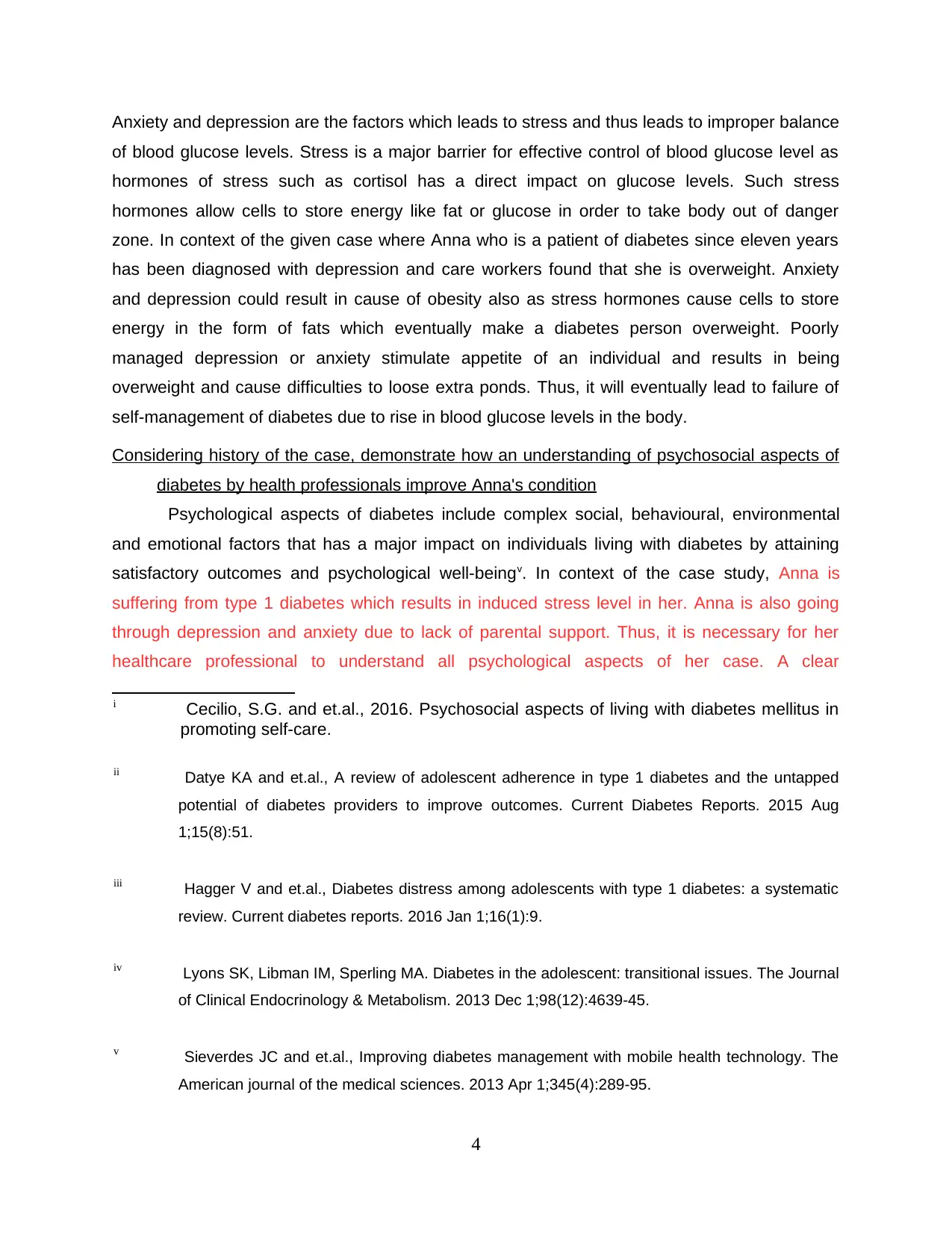
Anxiety and depression are the factors which leads to stress and thus leads to improper balance
of blood glucose levels. Stress is a major barrier for effective control of blood glucose level as
hormones of stress such as cortisol has a direct impact on glucose levels. Such stress
hormones allow cells to store energy like fat or glucose in order to take body out of danger
zone. In context of the given case where Anna who is a patient of diabetes since eleven years
has been diagnosed with depression and care workers found that she is overweight. Anxiety
and depression could result in cause of obesity also as stress hormones cause cells to store
energy in the form of fats which eventually make a diabetes person overweight. Poorly
managed depression or anxiety stimulate appetite of an individual and results in being
overweight and cause difficulties to loose extra ponds. Thus, it will eventually lead to failure of
self-management of diabetes due to rise in blood glucose levels in the body.
Considering history of the case, demonstrate how an understanding of psychosocial aspects of
diabetes by health professionals improve Anna's condition
Psychological aspects of diabetes include complex social, behavioural, environmental
and emotional factors that has a major impact on individuals living with diabetes by attaining
satisfactory outcomes and psychological well-beingv. In context of the case study, Anna is
suffering from type 1 diabetes which results in induced stress level in her. Anna is also going
through depression and anxiety due to lack of parental support. Thus, it is necessary for her
healthcare professional to understand all psychological aspects of her case. A clear
i Cecilio, S.G. and et.al., 2016. Psychosocial aspects of living with diabetes mellitus in
promoting self-care.
ii Datye KA and et.al., A review of adolescent adherence in type 1 diabetes and the untapped
potential of diabetes providers to improve outcomes. Current Diabetes Reports. 2015 Aug
1;15(8):51.
iii Hagger V and et.al., Diabetes distress among adolescents with type 1 diabetes: a systematic
review. Current diabetes reports. 2016 Jan 1;16(1):9.
iv Lyons SK, Libman IM, Sperling MA. Diabetes in the adolescent: transitional issues. The Journal
of Clinical Endocrinology & Metabolism. 2013 Dec 1;98(12):4639-45.
v Sieverdes JC and et.al., Improving diabetes management with mobile health technology. The
American journal of the medical sciences. 2013 Apr 1;345(4):289-95.
4
of blood glucose levels. Stress is a major barrier for effective control of blood glucose level as
hormones of stress such as cortisol has a direct impact on glucose levels. Such stress
hormones allow cells to store energy like fat or glucose in order to take body out of danger
zone. In context of the given case where Anna who is a patient of diabetes since eleven years
has been diagnosed with depression and care workers found that she is overweight. Anxiety
and depression could result in cause of obesity also as stress hormones cause cells to store
energy in the form of fats which eventually make a diabetes person overweight. Poorly
managed depression or anxiety stimulate appetite of an individual and results in being
overweight and cause difficulties to loose extra ponds. Thus, it will eventually lead to failure of
self-management of diabetes due to rise in blood glucose levels in the body.
Considering history of the case, demonstrate how an understanding of psychosocial aspects of
diabetes by health professionals improve Anna's condition
Psychological aspects of diabetes include complex social, behavioural, environmental
and emotional factors that has a major impact on individuals living with diabetes by attaining
satisfactory outcomes and psychological well-beingv. In context of the case study, Anna is
suffering from type 1 diabetes which results in induced stress level in her. Anna is also going
through depression and anxiety due to lack of parental support. Thus, it is necessary for her
healthcare professional to understand all psychological aspects of her case. A clear
i Cecilio, S.G. and et.al., 2016. Psychosocial aspects of living with diabetes mellitus in
promoting self-care.
ii Datye KA and et.al., A review of adolescent adherence in type 1 diabetes and the untapped
potential of diabetes providers to improve outcomes. Current Diabetes Reports. 2015 Aug
1;15(8):51.
iii Hagger V and et.al., Diabetes distress among adolescents with type 1 diabetes: a systematic
review. Current diabetes reports. 2016 Jan 1;16(1):9.
iv Lyons SK, Libman IM, Sperling MA. Diabetes in the adolescent: transitional issues. The Journal
of Clinical Endocrinology & Metabolism. 2013 Dec 1;98(12):4639-45.
v Sieverdes JC and et.al., Improving diabetes management with mobile health technology. The
American journal of the medical sciences. 2013 Apr 1;345(4):289-95.
4
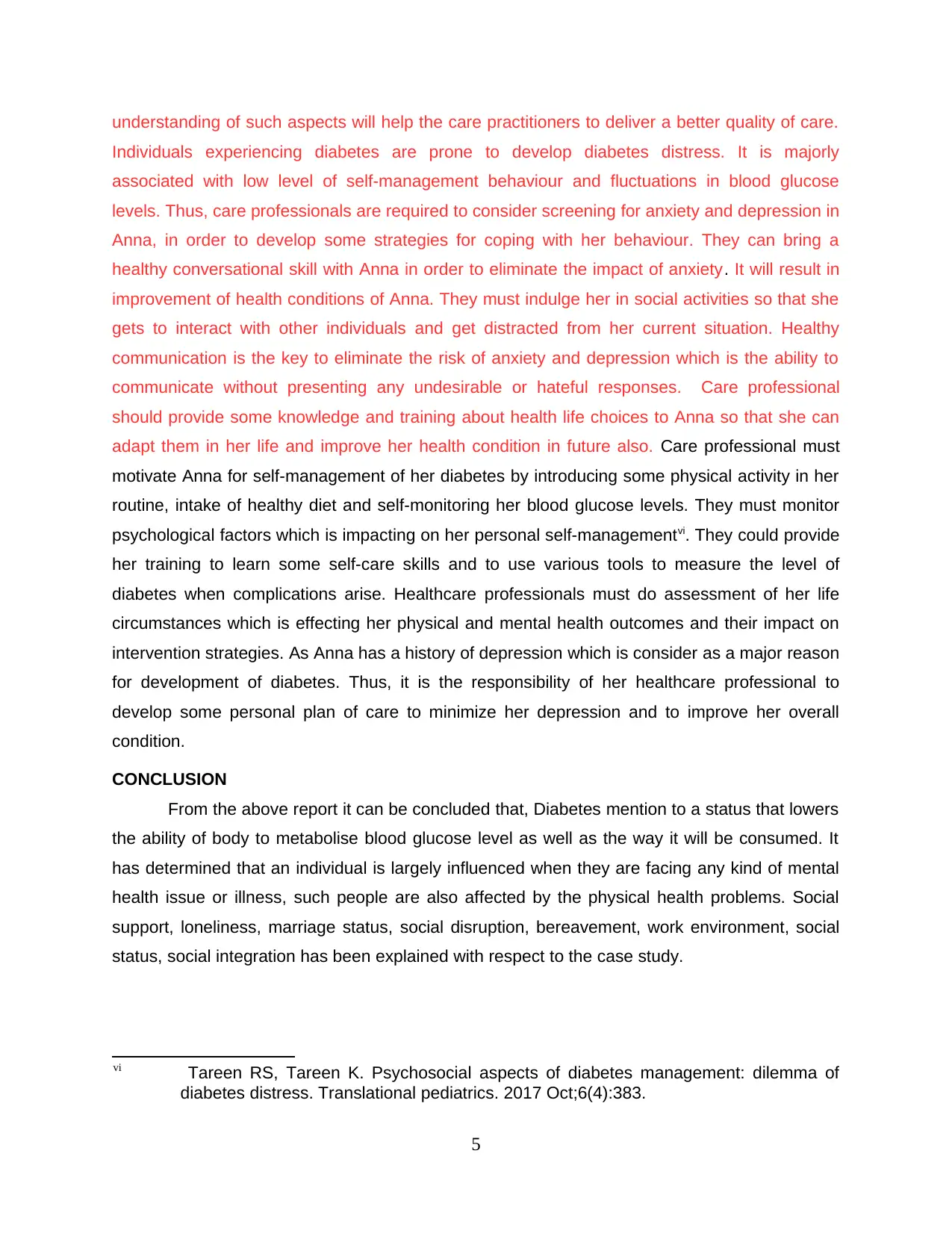
understanding of such aspects will help the care practitioners to deliver a better quality of care.
Individuals experiencing diabetes are prone to develop diabetes distress. It is majorly
associated with low level of self-management behaviour and fluctuations in blood glucose
levels. Thus, care professionals are required to consider screening for anxiety and depression in
Anna, in order to develop some strategies for coping with her behaviour. They can bring a
healthy conversational skill with Anna in order to eliminate the impact of anxiety. It will result in
improvement of health conditions of Anna. They must indulge her in social activities so that she
gets to interact with other individuals and get distracted from her current situation. Healthy
communication is the key to eliminate the risk of anxiety and depression which is the ability to
communicate without presenting any undesirable or hateful responses. Care professional
should provide some knowledge and training about health life choices to Anna so that she can
adapt them in her life and improve her health condition in future also. Care professional must
motivate Anna for self-management of her diabetes by introducing some physical activity in her
routine, intake of healthy diet and self-monitoring her blood glucose levels. They must monitor
psychological factors which is impacting on her personal self-managementvi. They could provide
her training to learn some self-care skills and to use various tools to measure the level of
diabetes when complications arise. Healthcare professionals must do assessment of her life
circumstances which is effecting her physical and mental health outcomes and their impact on
intervention strategies. As Anna has a history of depression which is consider as a major reason
for development of diabetes. Thus, it is the responsibility of her healthcare professional to
develop some personal plan of care to minimize her depression and to improve her overall
condition.
CONCLUSION
From the above report it can be concluded that, Diabetes mention to a status that lowers
the ability of body to metabolise blood glucose level as well as the way it will be consumed. It
has determined that an individual is largely influenced when they are facing any kind of mental
health issue or illness, such people are also affected by the physical health problems. Social
support, loneliness, marriage status, social disruption, bereavement, work environment, social
status, social integration has been explained with respect to the case study.
vi Tareen RS, Tareen K. Psychosocial aspects of diabetes management: dilemma of
diabetes distress. Translational pediatrics. 2017 Oct;6(4):383.
5
Individuals experiencing diabetes are prone to develop diabetes distress. It is majorly
associated with low level of self-management behaviour and fluctuations in blood glucose
levels. Thus, care professionals are required to consider screening for anxiety and depression in
Anna, in order to develop some strategies for coping with her behaviour. They can bring a
healthy conversational skill with Anna in order to eliminate the impact of anxiety. It will result in
improvement of health conditions of Anna. They must indulge her in social activities so that she
gets to interact with other individuals and get distracted from her current situation. Healthy
communication is the key to eliminate the risk of anxiety and depression which is the ability to
communicate without presenting any undesirable or hateful responses. Care professional
should provide some knowledge and training about health life choices to Anna so that she can
adapt them in her life and improve her health condition in future also. Care professional must
motivate Anna for self-management of her diabetes by introducing some physical activity in her
routine, intake of healthy diet and self-monitoring her blood glucose levels. They must monitor
psychological factors which is impacting on her personal self-managementvi. They could provide
her training to learn some self-care skills and to use various tools to measure the level of
diabetes when complications arise. Healthcare professionals must do assessment of her life
circumstances which is effecting her physical and mental health outcomes and their impact on
intervention strategies. As Anna has a history of depression which is consider as a major reason
for development of diabetes. Thus, it is the responsibility of her healthcare professional to
develop some personal plan of care to minimize her depression and to improve her overall
condition.
CONCLUSION
From the above report it can be concluded that, Diabetes mention to a status that lowers
the ability of body to metabolise blood glucose level as well as the way it will be consumed. It
has determined that an individual is largely influenced when they are facing any kind of mental
health issue or illness, such people are also affected by the physical health problems. Social
support, loneliness, marriage status, social disruption, bereavement, work environment, social
status, social integration has been explained with respect to the case study.
vi Tareen RS, Tareen K. Psychosocial aspects of diabetes management: dilemma of
diabetes distress. Translational pediatrics. 2017 Oct;6(4):383.
5
⊘ This is a preview!⊘
Do you want full access?
Subscribe today to unlock all pages.

Trusted by 1+ million students worldwide

6
Paraphrase This Document
Need a fresh take? Get an instant paraphrase of this document with our AI Paraphraser

REFERENCES
7
7
1 out of 8
Related Documents
Your All-in-One AI-Powered Toolkit for Academic Success.
+13062052269
info@desklib.com
Available 24*7 on WhatsApp / Email
![[object Object]](/_next/static/media/star-bottom.7253800d.svg)
Unlock your academic potential
Copyright © 2020–2026 A2Z Services. All Rights Reserved. Developed and managed by ZUCOL.





